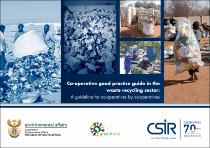 ResearchSpace
ResearchSpace
Co-operative good practice guide in the waste recycling sector: A guideline for co-operatives by co-operatives
JavaScript is disabled for your browser. Some features of this site may not work without it.
- ResearchSpace
- →
- Research Publications/Outputs
- →
- Books
- →
- View Item
| dc.contributor.author |
Strydom, W

|
|
| dc.contributor.author |
Godfrey, Linda K

|
|
| dc.date.accessioned | 2016-07-20T10:58:44Z | |
| dc.date.available | 2016-07-20T10:58:44Z | |
| dc.date.issued | 2015-09 | |
| dc.identifier.citation | Strydom, W. and Godfrey, L.K. 2015. Co-operative good practice guide in the waste recycling sector: A guideline for co-operatives by co-operatives. | en_US |
| dc.identifier.isbn | 978-0-7988-5623-2 | |
| dc.identifier.uri | http://hdl.handle.net/10204/8645 | |
| dc.description | Copyright 2016 CSIR. | en_US |
| dc.description.abstract | For as long as South Africa continues to generate “waste”, that waste has value, and while there are businesses prepared to buy the waste, we will continue to find formal and informal collectors of recyclables. “There will always be work, the market exists, rubbish will not go away…” The types and quantities of waste generated in the larger towns and cities of South Africa has created opportunities for people to earn a living through the collection of recyclables, salvaging paper, plastic, glass or tins from waste bins at kerbside or from landfill sites. As a means of stimulating job creation in the formal waste economy, these collectors of recyclables are often advised by government or other stakeholders, to group together and register as a co-operative. This grouping of people into a co-operative is intended to provide several benefits which individuals would not be able to achieve on their own. While the co-operative model provides invaluable benefits to members, employees and communities, when implemented incorrectly it can result in opportunistic registrations in order to access funding; exploitation of co-operative members by corrupt individuals who are more informed of the current systems; conflict between co-operative members who have no previous association; and an overdependence on support which is difficult to outgrow to form sustainable businesses. | en_US |
| dc.language.iso | en | en_US |
| dc.publisher | CSIR | en_US |
| dc.relation.ispartofseries | Workflow;16917 | |
| dc.subject | Waste recycling | en_US |
| dc.subject | Recycling sectors | en_US |
| dc.subject | Co-operatives | en_US |
| dc.title | Co-operative good practice guide in the waste recycling sector: A guideline for co-operatives by co-operatives | en_US |
| dc.type | Book | en_US |
| dc.identifier.apacitation | Strydom, W., & Godfrey, L. K. (2015). <i>Co-Operative good practice guide in the waste recycling sector: A guideline for co-Operatives by co-Operatives</i>. CSIR. http://hdl.handle.net/10204/8645 | en_ZA |
| dc.identifier.chicagocitation | Strydom, W, and Linda K Godfrey. <i>Co-Operative good practice guide in the waste recycling sector: A guideline for co-Operatives by co-Operatives</i>. n.p.: CSIR. 2015. http://hdl.handle.net/10204/8645. | en_ZA |
| dc.identifier.vancouvercitation | Strydom W, Godfrey LK. Co-Operative good practice guide in the waste recycling sector: A guideline for co-Operatives by co-Operatives. [place unknown]: CSIR; 2015.http://hdl.handle.net/10204/8645 | en_ZA |
| dc.identifier.ris | TY - Book AU - Strydom, W AU - Godfrey, Linda K AB - For as long as South Africa continues to generate “waste”, that waste has value, and while there are businesses prepared to buy the waste, we will continue to find formal and informal collectors of recyclables. “There will always be work, the market exists, rubbish will not go away…” The types and quantities of waste generated in the larger towns and cities of South Africa has created opportunities for people to earn a living through the collection of recyclables, salvaging paper, plastic, glass or tins from waste bins at kerbside or from landfill sites. As a means of stimulating job creation in the formal waste economy, these collectors of recyclables are often advised by government or other stakeholders, to group together and register as a co-operative. This grouping of people into a co-operative is intended to provide several benefits which individuals would not be able to achieve on their own. While the co-operative model provides invaluable benefits to members, employees and communities, when implemented incorrectly it can result in opportunistic registrations in order to access funding; exploitation of co-operative members by corrupt individuals who are more informed of the current systems; conflict between co-operative members who have no previous association; and an overdependence on support which is difficult to outgrow to form sustainable businesses. DA - 2015-09 DB - ResearchSpace DP - CSIR KW - Waste recycling KW - Recycling sectors KW - Co-operatives LK - https://researchspace.csir.co.za PY - 2015 SM - 978-0-7988-5623-2 T1 - Co-operative good practice guide in the waste recycling sector: A guideline for co-operatives by co-operatives TI - Co-operative good practice guide in the waste recycling sector: A guideline for co-operatives by co-operatives UR - http://hdl.handle.net/10204/8645 ER - | en_ZA |





